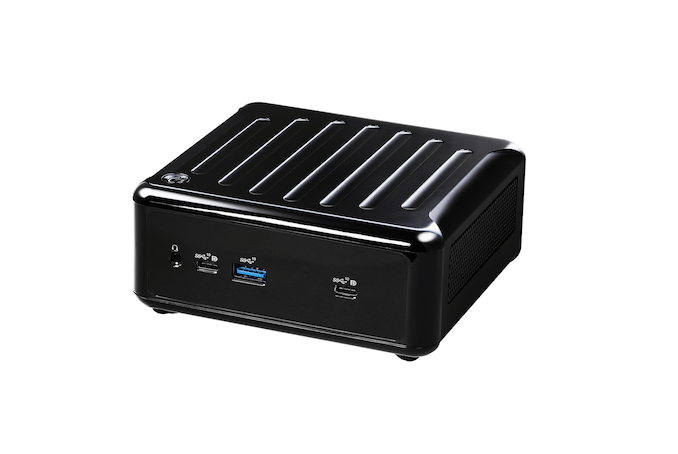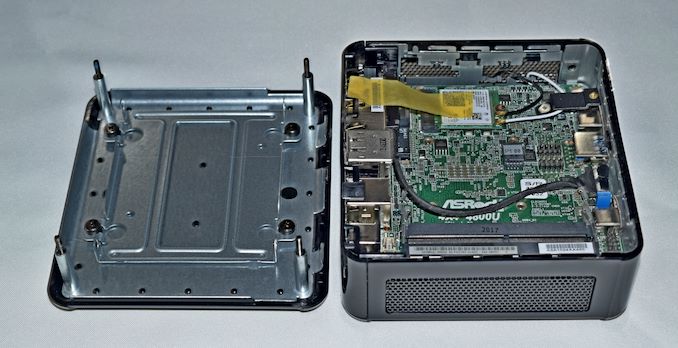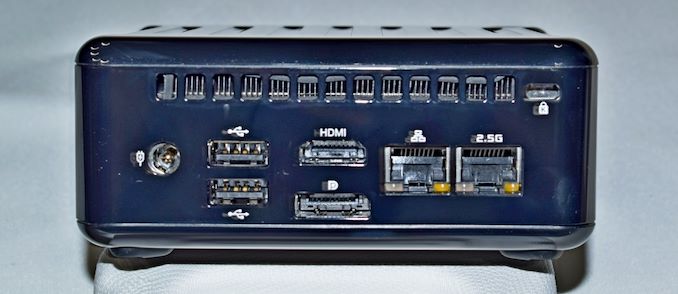ASRock Brings Zen 2 NUC : 4X4 BOX-4800U Renoir Mini-PC Reviewed
by Ganesh T S on November 25, 2020 11:00 AM EST
AMD-based ultra-compact form-factor (UCFF) systems are slowly gaining market acceptance, with the Zen architecture slowly catching up with Intel on both the performance as well as power consumption front. AMD's latest and greatest has been reserved for the high-end desktop market, with the parts meant for low-power / compact systems appearing a few quarters later. Zen 3-based desktop CPUs were introduced recently. However, Zen 2-based parts with 12-25W TDP (Renoir APUs) have started appearing in compact desktop systems only recently. ASRock Industrial launched the Ryzen 4000U-based 4X4 BOX-4000 series in September. The review below looks at the flagship model - the 4X4 BOX-4800U - and how it compares against the equivalent Comet Lake-U-based Frost Canyon NUC from Intel.
Introduction
The PC market has grown in the last few years, thanks in no small part to ultra-compact form-factor (UCFF) and gaming systems. Intel's NUC line-up has been ruling the roost in the former category. Given AMD's focus on multi-threaded performance and core counts with the first-generation Zen microarchitecture, Zen and Zen+-based Ryzen APUs did not have good enough power efficiency and performance per watt to make a dent in Intel's success in the NUC space. ASRock Industrial did release UCFF systems based on the AMD Ryzen Embedded Processors lineup (we reviewed one such system - the 4X4 BOX-V1000M). While the GPU prowess and multi-threaded performance turned out to be appreciable aspects, the single-threaded performance, power efficiency, and driver issues made it a tough sell against competing Intel-based NUCs. The introduction of Zen 2-based APUs (Renoir) fabricated in TSMC's 7nm process changed the equation by addressing all the aforementioned weak points.
AMD prioritized the delivery of Renoir APUs to the notebook market, with mini-PCs following soon after. ASRock Industrial was again at the forefront. Along with Asus's PN50, they were one of the first to launch systems based on these parts. The 4X4 BOX-4000 series has three different SKUs with CPU core counts of 4 (Ryzen 3 4300U), 6 (Ryzen 5 4500U), and 8 (Ryzen 7 4800U) each. The last one is the flagship, and that is the one we are looking at today.
The 4X4 BOX-4800U has a 104mm x 102mm main-board housed in a 110mm x 117.5mm x 47.85mm plastic chassis. The system matches the Intel NUCs in the footprint department. The board comes with a soldered processor - the Ryzen 7 4800U belonging to the AMD Renoir APU series. It is an octa-core processor with SMT enabled (8C/16T). It can operate with a TDP configurable between 12W and 25W.
ASRock Industrial sampled us a barebones version of the system. In partnership with Patriot Memory, they also provided us with their recommended storage (Patriot P300 PCIe 3.0 x4 NVMe SSD) and memory (Patriot Signature Line 2x32GB DDR4-3200 SODIMM) for usage with the PC.
The specifications of our ASRock 4X4 BOX-4800U review configuration are summarized in the table below.
| ASRock 4X4 BOX-4800U Specifications | |
| Processor | AMD Ryzen 7 4800U Zen 2 (Renoir) 8C/16T, 1.8 - 4.2 GHz TSMC 7nm, 8MB L3, 10 - 25 W (15W) |
| Memory | Patriot Memory PSD432G32002S DDR4 SODIMM 22-22-22-52 @ 3200 MHz 2x32 GB |
| Graphics | AMD Radeon Graphics (Renoir) - Integrated GPU with 8 CUs |
| Disk Drive(s) | Patriot P300 (512 GB; M.2 2280 PCIe 3.0 x4; Kioxia 96L 3D TLC) (Silicon Motion SM2263XT Controller) |
| Networking | Intel Wi-Fi 6 AX200 (2x2 802.11ax - 2400 Mbps) 1x Realtek RTL8111G Gigabit Ethernet Controller 1x Realtek RTL8125 2.5 Gigabit Ethernet Controller |
| Audio | 3.5mm Headphone Jack Capable of 5.1/7.1 digital output with HD audio bitstreaming (HDMI) |
| Miscellaneous I/O Ports | 2x USB 2.0 2x USB 3.2 Gen 2 Type-C 1x USB 3.2 Gen 2 Type-A |
| Operating System | Retail unit is barebones, but we installed Windows 10 Enterprise x64 |
| Pricing (As configured) | $600 (barebones) $878 (as configured) |
| Full Specifications | ASRock Industrial 4X4 BOX-4800U Specifications |
The ASRock Industrial 4X4 BOX-4800U kit doesn't come with any pre-installed OS, but does come with a CD containing the drivers. In any case, we ended up installing the latest drivers downloaded off the product support page. In addition to the main unit, the other components of the package include a 90 W (19V @ 4.74A) adapter, a US power cord, a VESA mount (along with the necessary screws), a driver CD, user's manual and a quick-start guide. Installing the storage and RAM is straightforward - a matter of popping off four screws on the chassis underside and mounting the components in the appropriate slot.
The above gallery shows the package components along with the chassis design and the internal components. The system also includes support for the installation of a 2.5" drive, with a very flexible SATA power / data cable already in place.
In the table below, we have an overview of the various systems that we are comparing the ASRock 4X4 BOX-4800U against. Note that they may not belong to the same market segment. The relevant configuration details of the machines are provided so that readers have an understanding of why some benchmark numbers are skewed for or against the ASRock 4X4 BOX-4800U when we come to those sections.
| Comparative PC Configurations | ||
| Aspect | ASRock 4X4 BOX-4800U | |
| CPU | AMD Ryzen 7 4800U | AMD Ryzen 7 4800U |
| GPU | AMD Renoir (Radeon RX Vega 8 / GCN5) | AMD Renoir (Radeon RX Vega 8 / GCN5) |
| RAM | Patriot Memory PSD432G32002S DDR4 SODIMM 22-22-22-52 @ 3200 MHz 2x32 GB |
Patriot Memory PSD432G32002S DDR4 SODIMM 22-22-22-52 @ 3200 MHz 2x32 GB |
| Storage | Patriot P300 (512 GB; M.2 2280 PCIe 3.0 x4; Kioxia 96L 3D TLC) (Silicon Motion SM2263XT Controller) |
Patriot P300 (512 GB; M.2 2280 PCIe 3.0 x4; Kioxia 96L 3D TLC) (Silicon Motion SM2263XT Controller) |
| Wi-Fi | Intel Wi-Fi 6 AX200 (2x2 802.11ax - 2400 Mbps) |
Intel Wi-Fi 6 AX200 (2x2 802.11ax - 2400 Mbps) |
| Price (in USD, when built) | $600 (barebones) $878 (as configured) |
$600 (barebones) $878 (as configured) |



















53 Comments
View All Comments
Stoinis MO - Thursday, December 3, 2020 - link
Macy’s cardholders need to activate their Macy’s card. Macy’s Card Activation allow their customer to activate Macy’s Card if users want to activate their Macy’s Card then with this post customers didn’t have to do more hard things.http://philagribiz.com/macys-card-activation/
deil - Thursday, November 26, 2020 - link
About ram it depends on how you work, I have 32GB and it daily goes above 24GB used, while browser/slack/spotify/30tabs on ff and few other things that I just never close take ~6GB. (I am on linux, it does use ram way more conservative that windows) When I last time used windows for work it did abuse all 32GB and started to slow down.its up to what you do and on 16GB it mostly work, but at least in my case 2-3 times a day I need a bit more, and like once a week 16GB is just not enough.
as It costs just like 70$ once, and it saves me few minutes daily, I think it paid for itself in my health at least.
damianrobertjones - Thursday, November 26, 2020 - link
Plus there's also SUperfectch that caches various duties. A lot of people forget that.Spunjji - Friday, November 27, 2020 - link
"...I've had more crashes in a month than in years of Intel/Nvidia systems. I've lost more time to lost work than when I was using Windows 98..."I'm calling bullshit on that. My understanding is that the APU driver situation isn't as good as discrete components (which I'm currently running without issue), but I can't believe that it's *worse than Windows 98*.
philehidiot - Monday, November 30, 2020 - link
Bullshit? Perhaps because you've just made assumptions about the set up? Read properly before accusing people of lying.Thanks.
at_clucks - Thursday, December 3, 2020 - link
I guess they were saying it's PEBKAC. Which it is. Having even 2 or 3 crashes in a month is already too much to be caused by AMD, their hardware, or their drivers, or else tens or hundreds of thousands of people would be affected and you'd hear about it. Not saying their drivers are perfect but if your PC is constantly crashing *you* have a problem. You probably don;t really know what's happening in there but you heard a rumor...I lost count of how many acquaintances had rootkit encrusted PCs, full of every garbage known to man after clicking on everything that fell under their mouse, everything running with hacks, cracks, and other torrented junk, from the OS image to the "security" software. They had no idea what's going on but all had some form of (ridiculous) theory based of stuff they heard from someone, or read on the internet but probably neither them nor their source understood it.
Fix your stuff, stop blaming the tools. Also having at least a decent meal before drinking helps.
Radhouse - Friday, November 27, 2020 - link
Interesting experience. I've been using an ASUS PN50 R5 4500 system for 2 months as my entertainment computer without a single crash, and typically keep 25+ web pages open in Chrome. It is configured with 32 GB 3200 MHz Crucial memory and an 500 GB EV0 970 Plus SSD running Windows 10 Pro 20H2. (Initially installed V 2004) In addition to Chrome, I'm a heavy user of the following Apps; Netflix, Amazon, & Hulu.I'm not sure where the source of your problems, but I've been also running a PN50 R3 system as a workstation without any issues.
Targon - Friday, November 27, 2020 - link
No problem with AMD drivers for my X370 based motherboard, Ryzen 9 3900X CPU, or Vega64 reference model video card(yes, I need a 6800X or 6900X, just waiting on the 6900X to be released at this point). People who claim to have this or that problem may be encountering problems between components that in turn cause their issues with Radeon cards. Looking for what is in common between people who have a problem and then looking at those without problems to see what the differences are is something that most people don't seem to understand.QA process: Reproduce problem, identify source of problem, figure out workaround or fix for the problem.
philehidiot - Monday, November 30, 2020 - link
Your set up is very close to mine. 3900x, vega64, but I'm on the x570 mobo.What is very strange is these crashes are happening at low load (as is when working). No crashes during games or when I'm hammering it. It is unlikely to be a dodgy background application as it's a fairly new install and I routinely avoid installing bloat, etc. Only stuff required to make it go is enabled on start up to this end.
I'm on the verge of shifting to Linux but for one major issue - I have a decent sound card which is not supported in Linux. I'm unwilling to unplug and ditch a few hundred quid worth of kit. Hopeful Linux drivers will emerge but creative aren't exactly helpful.
damianrobertjones - Monday, November 30, 2020 - link
Shift. Do it. Go to linux. You might then appreciate Windows a little more. Maybe. Both platforms have issues.